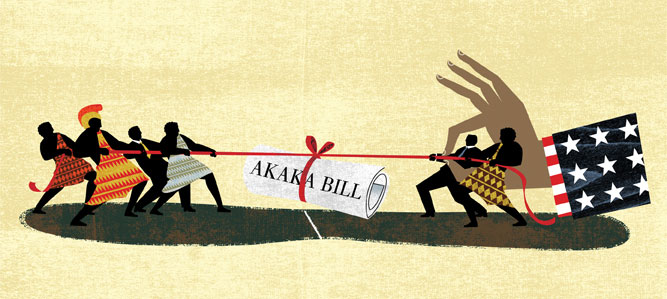Story by Ilima Loomis | Illustration by Mike Austin
 For more than a century, Native Hawaiians have been American citizens, a tiny minority in the vast demographic landscape of the United States. It wasn’t always so.
For more than a century, Native Hawaiians have been American citizens, a tiny minority in the vast demographic landscape of the United States. It wasn’t always so.
Just a few generations ago, it was white Americans who were visiting aliens in Hawai‘i, an independent kingdom that had diplomatic relations with England, France, the U.S. and other nations; and which set its own laws, imposed its own taxes, and protected its own citizens.
That all changed one January night in 1893, when a militia led by American businessmen in Honolulu, and backed by a U.S. warship, took control of the Hawaiian government at gunpoint. The native people of the islands have been subjects of the United States ever since.
The U.S. government long ago recognized the semi-autonomous status of other native peoples within its borders, from American Indian tribes that govern themselves on reservations, to Alaska Natives who established corporations to settle land and monetary claims. It never gave the same recognition to Hawaiians. The other groups were recognized as indigenous peoples, and given special legal status. Hawaiians were just another ethnic minority.
That rankled U.S. Sen. Daniel Akaka. The only Native Hawaiian member of Congress, Akaka said Hawaiians’ disparity with other native Americans inspired him to write the Native Hawaiian Government Reorganization Act, which would give federal recognition to Hawaiians as an indigenous group.
“It’s a matter of parity with the relationship other indigenous people have had with the United States,” he said in an interview.
With a Democratic majority in Congress, and the support of a new Democratic president—who happens to have been born in Hawai‘i—Akaka thinks his bill finally has a good chance of becoming law, a decade after it was first introduced.
But the bill still faces opposition from both sides of the political spectrum.
Akaka acknowledges that he still must overcome the opposition of many Congressional Republicans, who feel the bill is discriminatory and race-based, because it would set up special rights for Hawaiians. Others on the right fear the bill could lead to Hawai‘i’s secession.
At the same time, Native Hawaiian sovereignty advocates have fought the Akaka Bill, saying it undermines their struggle for true and final independence from the United States.
“What’s ironic,” says Office of Hawaiian Affairs Trustee Boyd Mossman, “is that these guys, on the left on one side, and on the right on the other side, go to Congress shoulder to shoulder and fight the Akaka Bill, with totally opposite reasoning.”
Legal Umbrella
The Akaka Bill wouldn’t establish a Hawaiian government, but it would start the process for Hawaiians to do so, says Professor Jon Van Dyke of the University of Hawai‘i’s Richardson School of Law.
“It’s an umbrella, a facilitative bill,” he says. “It provides a framework for native people to decide how they want to create a Native Hawaiian nation.”
Each Indian tribe on the mainland is set up differently and has a unique relationship with the federal government. It would be up to Hawaiians to decide what form their government would take, and how many programs and responsibilities it would assume, he adds.
“Some groups govern expansively: schools, welfare, roads, zoning, courts, law enforcement, taxes—like a county,” Van Dyke says. “Others, usually smaller native groups, coordinate with local officials to take on some assignments and forego others. Some native groups actually become municipalities.”
Under the Akaka Bill, Hawaiians would be limited in the kind of government they could form, adds Mossman, a retired Second Circuit judge who is himself a Native Hawaiian. The organizing process would have to be approved by the federal Department of the Interior, and the future government would be subject to federal, state and county laws.
That means Hawaiians couldn’t secede from the United States or establish a monarchy, for example. And Sen. Akaka has amended his bill to specifically ban legalized gambling—removing a point of contention for Gov. Linda Lingle and gambling opponents in Hawai‘i, one of only two states in the nation that prohibit gambling.
But in opening the door for a Hawaiian government, the Akaka Bill could provide some protection from legal challenges for programs aimed at helping Native Hawaiians. Under existing U.S. law, such programs could be struck down as “race-based,” Mossman says. “We can’t defend ourselves without that legal basis. . . . the recognition by Congress of Hawaiians as an indigenous people and as a governing entity.”
A Matter of Birthright
But some Hawaiians bristle at the offer to organize on the federal government’s terms.
Henry Noa, head of the Reinstated Hawaiian Government, sees the Akaka Bill as a “cynical” compromise of Native Hawaiian claims on land and sovereignty in exchange for meager protections from a power that took Hawai‘i by force 100 years ago.
The Hawaiian kingdom never agreed to give up its lands and authority to the United States, but the Akaka Bill would require Hawaiians to yield to the federal government once and for all, Noa says.
“It clearly states the Hawaiian governing entity will still be subject to U.S. laws, state laws, county laws,” he says. “My question is, aren’t we already subjugated to that?”
Noa and other supporters of Hawaiian independence point to the “Apology Resolution” passed by Congress in 1993, which acknowledged that the United States’ overthrow of Hawai‘i’s sovereign government a century earlier was illegal. One hundred years later, sovereignty advocates refuse to acknowledge the authority of what they see as a “foreign government.”
Many in the sovereignty movement hold out hope that the United Nations will ultimately vindicate them and restore the original Hawaiian government, Mossman says.
“They say they are still an independent nation; they were never part of America.”
From that perspective, accepting a compromise with the Akaka Bill would mean giving up that dream forever.
“What [sovereignty advocates] want is everything,” says Mossman. “They don’t want a tiny piece of the pie, within an American umbrella. They want everything back.”
Mossman thinks Hawaiians should be realistic about their expectations. “For all the complaints people have that are hindering passage of the bill, the result is they can perfect themselves out of anything, and we get nothing.”
But Noa urges his followers not to settle for what he sees as scraps.
“I’m hoping Hawaiians will make the effort to understand the Akaka Bill and how it will damage our people,” he says. “Don’t be so quick to compromise your inheritance for some meager federal programs.”
“Every Bad Category”
While some focus on the principles and history behind the Akaka Bill, others look at the reality of life affecting Native Hawaiians today. And going by numbers alone, it’s a concerning picture.
Native Hawaiians lead other ethnic groups in Hawai‘i for a number of troubling indicators.
Statewide, 59 percent of Hawaiians are overweight or obese, more than 10 percentage-points higher than the next highest ethnic group. Hawaiians make up 32 percent of the people on welfare in Hawai‘i, and 38 percent of the state’s prison inmates, more than any other group in both categories. Hawaiians are even more likely to be smokers than other groups, according to OHA’s Native Hawaiian Data Book 2006.
“Hawaiians lead in every bad category of statistics,” Mossman says.
For Rev. Tasha Kama of Wailuku’s Christian Ministry Church, a community organizer active in Hawaiian social issues, those numbers are a sign of native people “alienated from [their] own land.”
Living under a government based on Western structures and values has been a century-long culture shock for Hawaiians, Kama says.
At one level, establishing their own government would allow Hawaiians to identify the issues challenging their community, and address them in their own way, she says.
At another, it could mean Hawaiians will finally get the resources they need to take care of their own.
“In setting up this entity, we’ll be at a place where we can actually negotiate with the federal government to get just compensation for the illegal uses of our ceded lands,” Kama says, referring to the 1.2 million acres formerly owned by the Hawaiian crown, that were taken over by the U.S. when the islands were annexed.
“Hopefully, that gives us parity to get more money to take care of our people in terms of health, education and welfare. To me, that’s a better way of helping our people, because they should be the ones to determine how to use that money on their behalf.”
Next Steps
The state government currently turns over 20 percent of revenues on ceded lands to the Office of Hawaiian Affairs, and OHA would “phase out” if a Hawaiian government is formed, Van Dyke says.
That future government would then have to reach its own agreement with the state over ceded lands and their revenues.
With the ruling of the U.S. Supreme Court in March that the state has full ownership of ceded lands, “the state would have to be centrally involved in any negotiations for return of lands,” Van Dyke says.
But even if the Akaka Bill is passed soon, it could be years more before a new government becomes reality, says Mossman. Organizers would first have to establish a voting base, which would then elect representatives to a convention to write the constitution for a Native Hawaiian government. Once that took place, Hawaiians would head back to the voting booth to choose their leaders.
While Mossman thinks it’s unlikely all 1.2 million acres of ceded lands would be returned to Native Hawaiians, he expects at least a portion would be turned over.
That could mean non-Hawaiians would lose some access to lands now shared by all residents of Hawai‘i—for example, areas set aside for farming would be available only to Hawaiians, and natural resources would be kept by Hawaiians, Mossman says.
But to the extent that it allows the state’s original people—and by many measures, its most challenged ones—to help themselves, the Akaka Bill will improve life for everybody in Hawai‘i, its writer says.
“As it helps Native Hawaiians, it will help the rest of the community,” says Akaka. “Governance was cut off from Hawaiians, and putting it back will raise the level of Hawaiians, and as that happens it will raise the level of Hawai‘i and, I think, this nation.”
Timeline
1778
Captain James Cook arrives in Hawai‘i.
1887
Under duress, King Kalakaua signs the Bayonet Constitution, drastically reducing his power and the voice of Native Hawaiians in government.
1889
Robert Wilcox, a young part-Hawaiian, leads an unsuccessful insurrection against the Bayonet Constitution.
1891
Kalakaua dies. His sister and successor, Queen Lili‘uokalani, reluctantly swears to uphold the Bayonet Constitution.
1892
A group of American businessmen, among them Lorrin Thurston, forms an Annexation Club with the goal of overthrowing the queen.
1893
Urged by her subjects, Lili‘uokalani writes a new constitution that will restore her to power. Backed by U.S. troops, the annexationists overthrow the monarchy, create a provisional government and declare martial law. Thurston sails to Washington to propose
a treaty of annexation.
President Grover Cleveland, who supports Lili‘uokalani’s cause, turns the matter over to Congress—which neither restores the monarchy nor moves to annex Hawai‘i.
On January 17, under protest, Lili‘uokalani yields her throne “to avoid any collision of armed forces and perhaps loss of life. . . .” Her Royal Guards surrender their arms.
1894
On July 4—America’s Independence Day—Sanford Dole declares himself president of the nascent Republic of Hawai‘i.
1895
Robert Wilcox leads a failed attempt to restore the queen. He and most of the royalists are captured.
When a weapons cache is unearthed in her garden, Lili‘uokalani is placed under house arrest.
1896
The deposed queen travels to Washington to ask for Cleveland’s help. He welcomes her warmly, but says he can do nothing.
1897
President William McKinley sends the annexation treaty to the Senate. Hawaiians petition Congress with 29,000 signatures opposing annexation.
1898
The Spanish–American War awakens Congress to Hawai‘i’s strategic position in the Pacific. They vote for annexation.
On August 12, sovereignty is formally transferred to the United States, with Sanford Dole as governor of the Territory of Hawai‘i. The Hawaiian anthem, with lyrics by Kalakaua, is played as the Hawaiian flag is lowered and replaced by the U.S. flag and anthem.
1917
Lili‘uokalani dies.
1993
On the centennial of the overthrow, Congress passes, and President Clinton signs, a joint resolution apologizing to Native Hawaiians for the government’s role in deposing the Hawaiian monarchy.
Information for this timeline came from Pat Pitzer’s excellent article “The Overthrow of the Monarchy,” Spirit of Aloha, May 1994.





